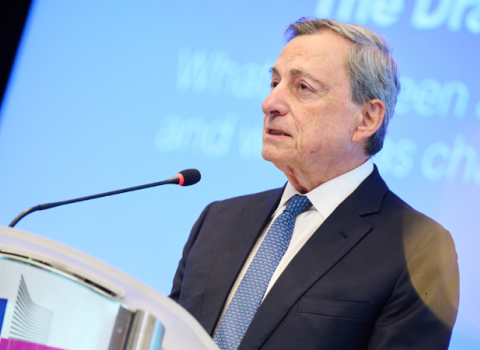FP10 a ‘top priority’, Ekaterina Zaharieva tells MEPs, quelling fears R&D budget would be merged with the competitiveness fund

Ekaterina Zaharieva, commissioner designate for Start-ups, Research and Innovation. Photo credits: Aurore Martignoni / European Union
Ekaterina Zaharieva, commissioner designate for Start-ups, Research and Innovation has diffused fears that research funding will be merged in a mega competitiveness fund, telling MEPs the development of the next Framework Programme will be a “top priority” of her mandate.
In written responses to questions from the European Parliament published today ahead of her in-person hearing on 5 November, Zaharieva lays out her preliminary vision for “a new and strengthened Framework Programme 10”, drawing on the recent Draghi report on EU competitiveness and the conclusions of the Commission’s independent FP10 advisory group.
Concerns were raised in the research community when President Ursula von der Leyen did not mention FP10 in her mission letter to Zaharieva and a leaked memo revealed plans within the Commission’s budget directorate to incorporate a dozen R&I programmes into a single European Competitiveness Fund.
Zaharieva’s answers to MEPs suggest there will be an overarching R&I programme to replace Horizon Europe, although this could still be placed within the Competitiveness Fund.
She promises to work to increase research spending, enhance simplification, and “focus the Framework Programme more where it matters and has the highest European added value.”
FP10 should provide simpler and faster access to EU funding, better alignment with EU policy priorities, enhance the use of artificial intelligence to inform and support participants, and increase the use of “simplified funding forms like lump sums and personnel unit costs” Zaharieva said. She also wants to increase SME participation and boost public-private partnerships.
Safeguarding
In line with promises made by von der Leyen, Zaharieva plans to expand the European Research Council (ERC), which mainly funds early stage research, and the European Innovation Council (EIC), which helps to develop and scale up innovations.
She pledged to “safeguard” ERC’s autonomy, which the FP10 expert group highlighted as crucial. However, she makes no reference to its recommendation for two new independent councils to oversee industrial competitiveness and technology, and societal challenges.
Zaharieva’s plans for the EIC would involve “initiat[ing] an even stronger focus on high risk investments from early stage research to demonstration and market deployment, with a focus on key strategic technologies for the EU’s competitiveness”.
The future of the European Institute of Innovation and Technology (EIT), which aims to integrate education, research and business through its Knowledge and Innovation Communities, is less certain.
The expert group report proposes discontinuing EIT’s predefined EU funding, but Zaharieva leaves the door open to all options. “I will explore ways to further streamline its mission, improve synergies with the other innovation instruments, reinforce transparency and expand its focus on nurturing emerging talents and building entrepreneurial skills,” she said.
There have also been calls to move Widening measures supporting countries with low Horizon Europe participation rates out of the Framework Programme. Zaharieva praised the measures but said she would consult with Parliament, member states and stakeholders on how to address the ongoing east-west research divide.
“Addressing the research and innovation divide is a must if we are to maximise Europe's potential, wherever it comes from. Widening actions are already working in this respect, with increased success rates for beneficiaries from Widening countries in Horizon Europe compared to Horizon 2020,” she said, also citing initiatives from the EIT.
Aligning priorities
Zaharieva’s mission letter also included plans to propose a European Research Area (ERA) act to tackle fragmentation and ensure that research and innovation becomes the ‘fifth freedom’ of the EU single market, as Enrico Letta’s high-level report also recommended.
Zaharieva says the ERA act will address the alignment of R&I priorities, skills development and research careers and scientific freedom, and help to build “a true European Research and Innovation Union” – the term used in the Draghi report.
The legislation can support the target of investing 3% of GDP in research and development by coordinating national and EU R&I budgets, and reforms via the European Semester, the EU’s main policy tool for coordinating economic and fiscal policy across the bloc.
The idea of guaranteeing the free movement of researchers, knowledge and technology dates back to 2000, but its implementation has proved difficult. On Tuesday, the Commission published an analysis of progress towards implementing ERA since it was revamped in 2020.
That reform introduced joint priority setting between member states, stakeholders and the Commission. This “has fostered a sense of ownership and increased commitment to implementation,” the analysis concludes. However, low investment, insufficient coordination and administrative burden persists and “prevents the EU from leveraging its full scientific potential for the benefit of the economy and society”.
28th regime
Once confirmed in post Zaharieva plans to conduct a consultation with stakeholders to shape an EU start-up and scale-up strategy, drawing on the Draghi report.
Her goal is to launch the strategy alongside a European Innovation act that streamlines regulations, enhances access to venture capital, and supports testing services for start-ups and scale-ups.
“We must enable Europe’s start-ups and scale-ups to grow, thrive in Europe, and compete globally,” she said.
A key component of her plan is the introduction of a unified EU-wide legal status for start-ups and innovative companies, the so-called “28th regime”.
Additionally, Zaharieva intends to establish a start-up task force within the Commission and organise a European start-up and scale-up forum in the first half of 2025.
Zaharieva will work with her fellow commissioners on the development of a savings and investments union, integrating the Capital Markets Union and the Banking Union. These tools will work in together to ensure EU innovations can scale effectively and reach the market, by improving access to diverse funding sources, especially for disruptive and high-risk ventures.
In addition, Zaharieva proposes a European strategy on research infrastructures to ensure EU researchers, particularly those from industry, SMEs, and start-ups have access to world-class facilities and services.
Other proposals include a strategy to increase AI uptake in science, a strategy for European life sciences and an Advanced Materials act.
Education and inclusivity
Education is not part of Zaharieva’s mandate, much to the disappointment of universities, but she plans to work closely with the executive vice president for people, skills and preparedness.
Zaharieva acknowledges the shortage of STEM graduates in many European countries. If confirmed, she plans to promote researcher mobility across member states and provide STEM students with more “hands-on experience in research, problem solving, and real world applications.” This initiative aims to bridge the gap between academic knowledge and industry needs, while helping graduates transition more smoothly into the workforce.
In line with this strategy, Zaharieva intends to further strengthen programmes including the European degree, Erasmus+, and the Marie Skłodowska-Curie Actions. These “illustrate how synergies across higher education and research support the training, skills, and career development, and mobility of researchers,” she says.
Zaharieva also said she is committed to the European Universities alliances programme.
Another focus will be to support women in research, innovation and start-ups, and increasing participation of female scientists in initiatives such as the Marie Skłodowska-Curie Actions. Zaharieva says gender equality will be a “core priority”.
There is also a plan to convene annual youth policy dialogues to engage young researchers and to strengthen the youth component of the ERA, “to improve mobility, career development, and employment conditions for researchers, in particular those in their early careers.”
The written questions and answers from other commissioners designate are available online. Their hearings in relevant European Parliament committees will take place between 4 and 12 November.





 A unique international forum for public research organisations and companies to connect their external engagement with strategic interests around their R&D system.
A unique international forum for public research organisations and companies to connect their external engagement with strategic interests around their R&D system.